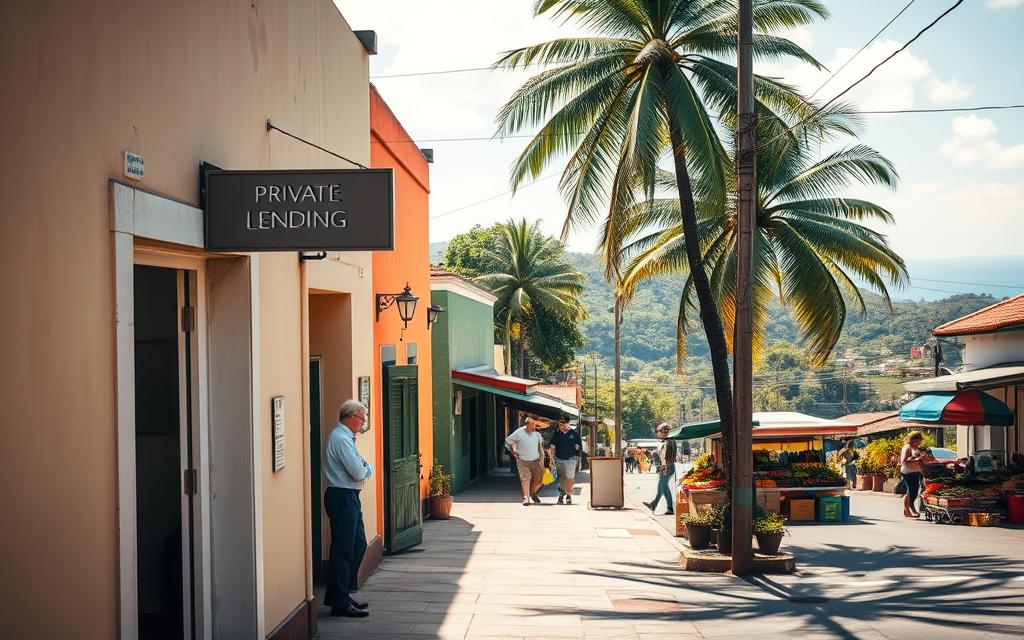We offer hard-money-loans-for-real-estate-investments-in-costa-rica with competitive rates and flexible terms. Secure financing for your investment property with ease.

A Guide to Private Lending in Costa Rica
Financing property in Costa Rica can be challenging, especially for non-residents. Traditional bank financing often comes with stringent requirements and lengthy processes. However, Costa Rica Home Equity Loans offer a viable alternative, providing access to significant funds with easier qualification since your home serves as collateral.
We connect borrowers with private investors and lenders, offering competitive rates, lower fees, and flexible financing options compared to traditional banks. With hundreds of outdated articles online, it’s essential to do your own research. Private lending has become increasingly popular in Costa Rica’s real estate market, particularly among foreign investors.
Understanding the private lending landscape is crucial before beginning your property search. It bridges the gap for non-residents who face significant hurdles with traditional banking options. Our guide will explore the unique aspects of private lending in Costa Rica, covering application processes, interest rates, and qualification requirements.
Understanding the Costa Rican Financing Landscape
The Costa Rican financing landscape presents unique challenges for foreign investors looking to purchase property. Financing property is relatively straightforward for citizens and residents, as lenders require strong ties to the country, known as “arraigo.” However, this requirement poses significant challenges for non-residents.
Traditional Banking Options for Non-Residents
Costa Rica’s traditional banking system is divided into government-owned and private banks. Government-owned banks are often cumbersome and bureaucratic, making them less accessible to foreign investors. Private banks, while more versatile and client-oriented, still maintain stringent qualification criteria that many non-residents struggle to meet. As a result, few local banks finance home or property purchases for non-residents.
The Rise of Private Lending Solutions
The limitations in traditional financing have created a gap in the market, filled by private lenders over the past decade. Private lending has emerged as a viable alternative, offering more accessible financing options with streamlined processes specifically designed for non-resident investors. The Costa Rican real estate market has adapted to these financing challenges, with private lending becoming an integral part of the property purchase process for foreigners.
What Is Private Lending in Costa Rica?
Private lending in Costa Rica has emerged as a vital financing option for individuals looking to invest in property. This alternative financing solution is provided by private individuals or specialized lending companies, known locally as “Prestamistas.”

Definition and Key Characteristics
Private lending in Costa Rica involves loans secured by real estate collateral, typically through a First Degree Mortgage. These lenders operate outside the traditional banking system, offering greater flexibility in lending criteria and processes. Private loans usually feature shorter terms, typically ranging from 1 to 3 years, with interest rates generally between 12% to 20% annually.
The key characteristics of private lending in Costa Rica include a focus on the property’s value rather than the borrower’s financial history, faster loan approval and funding processes, and fewer documentation requirements compared to traditional bank financing.
How Private Lending Differs from Bank Financing
The primary difference between private lending and bank financing lies in their qualification processes and lending criteria. Private lenders prioritize the value of the collateral property, allowing for more flexible qualification requirements. This makes private lending an attractive option for non-residents or individuals who may not meet traditional banking requirements.
Additionally, private lenders can approve and fund loans much faster than banks, often completing the process in weeks rather than months. While interest rates may be higher with private lenders, they offer significant advantages in terms of accessibility and flexibility.
Types of Private Loans Available in Costa Rica
Costa Rica offers a diverse range of private lending options for property owners and investors. These loans cater to various financial needs, from accessing capital for property purchases to financing construction projects.
Home Equity Loans
Home equity loans are a popular private lending option in Costa Rica, allowing property owners to borrow money using their existing property as collateral. These loans typically enable borrowing between 40-60% of the property’s appraised value, providing substantial capital while maintaining a safety margin for the lender. GAP Equity Loans offer competitive terms for home equity loans, making it easier for property owners to access funds.
Bridge Financing and Short-Term Options
Bridge financing provides short-term solutions, typically ranging from 6 to 18 months, for buyers who require immediate funds while arranging long-term financing or awaiting other capital to become available. This type of financing is crucial for investors looking to capitalize on time-sensitive opportunities in Costa Rica’s property market.
Other short-term options include construction loans, which are disbursed in phases as the building progresses, and purchase money loans, which help buyers acquire property when traditional bank financing is unavailable. These loan types are accompanied by specific qualification criteria and interest rates, reflecting the level of risk associated with them.
The Benefits of Private Lending for Property Purchases
For those seeking to invest in Costa Rican real estate, private lending provides a faster and more flexible alternative to traditional financing. Our goal is to simplify the process, helping hardworking individuals secure the financing needed to achieve their investment property goals without unnecessary hurdles.
Faster Approval Process
Private lending offers a significantly expedited approval process compared to traditional banks. Many loans are approved within 1-2 weeks, rather than months. This speed is crucial in competitive real estate markets where time is of the essence.
Flexible Qualification Requirements
The qualification requirements for private lending are more flexible than those of traditional banks. Private lenders focus on the property’s value and condition rather than the borrower’s extensive personal financial history. This makes it easier for individuals with credit history issues to qualify for a loan.
Customizable Loan Terms
Private lenders can customize loan terms to match the borrower’s specific needs. This includes interest-only periods, balloon payments, or flexible repayment schedules. Such flexibility allows borrowers to manage their finances more effectively.
Understanding Interest Rates and Loan Terms
When considering private lending in Costa Rica, understanding the interest rates and loan terms is crucial for making informed decisions. Private lending offers an alternative to traditional bank financing, but it comes with its own set of conditions and risks.
Current Interest Rate Environment
In 2024, the interest rate environment for private loans in Costa Rica is characterized by rates that typically range from 12-18% annually for USD-denominated loans. This is higher than traditional bank financing, which usually charges between 8-10% in US dollars. The higher rates reflect the increased risk private lenders assume. Factors influencing interest rates include the loan-to-value ratio, property type and location, borrower profile, and current market conditions. For instance, lower loan-to-value ratios (typically under 50%) may qualify for more favorable interest rates as they represent lower risk to the lender. You can explore more about private lending options on GAP Equity Loans.
Typical Loan Duration and Repayment Options
Private loan terms in Costa Rica are substantially shorter than traditional mortgages, typically ranging from 6 months to 3 years, with some lenders offering extensions under certain conditions. Repayment structures vary, including interest-only payments with a balloon payment at maturity, fully amortized loans, or custom payment schedules. Understanding the total cost of financing is crucial, as private loans often include origination fees (1-3% of the loan amount) and legal costs for preparing and registering the mortgage.
Qualification Requirements for Private Loans
Qualifying for a private loan in Costa Rica requires a comprehensive understanding of the lender’s criteria. Private lenders focus on the value of the property as the primary security for the loan, making property valuation a critical step in the qualification process.
Property Valuation and Loan-to-Value Ratios
Property valuation forms the cornerstone of private lending qualification, with professional appraisals determining the maximum loan amount available. Loan-to-value (LTV) ratios for private loans typically range from 40-60%, significantly lower than the 70-80% offered by traditional banks, reflecting the higher risk assessment. The property’s location, condition, and marketability significantly impact loan approval and terms.

Documentation Needed for Non-Residents
Non-residents seeking private loans in Costa Rica must provide identification documents, proof of address in their home country, and basic financial information to establish their creditworthiness. Unlike banks, private lenders typically do not require extensive income verification. Due diligence on the property includes title searches, lien verifications, and, in some cases, environmental assessments to ensure the collateral is legally sound.
The Private Lending Process in Costa Rica
Navigating the private lending process in Costa Rica requires knowledge of its distinct stages. We will guide you through the essential steps involved in securing a private loan for your property in Costa Rica.
Initial Application and Assessment
The private lending process typically begins with an initial consultation to discuss the borrower’s needs, property details, and preliminary loan terms. The formal application requires basic personal information, property details, and the requested loan amount, with much less paperwork than traditional bank applications.
- Basic personal and property information is required for the application.
- The process is streamlined, reducing the time needed for approval.
Property Appraisal Process
Property appraisal represents a critical step, with lenders hiring independent appraisers to determine the current market value of the collateral property. Due diligence includes title searches through the National Registry to verify ownership and confirm the absence of liens or encumbrances that could affect the property’s value.

Closing and Fund Disbursement
The closing process requires the borrower (and seller, if applicable) to appear before a notary public to sign the mortgage documents and complete the transaction. Fund disbursement typically occurs immediately after closing for equity loans, or in scheduled installments for construction loans after the borrower has invested their portion.
- The closing process involves signing mortgage documents before a notary public.
- Funds are disbursed according to the loan type and construction progress.
The entire process from application to funding usually takes 2-3 weeks, significantly faster than the 2-3 months required for traditional bank financing. We provide a detailed timeline to help borrowers understand what to expect at each stage.
GAP Equity Loans: A Private Lending Solution

In the realm of Costa Rican real estate financing, GAP Equity Loans stands out as a prominent private lending solution. They specialize in providing financing secured by Costa Rican real estate, catering to various investment strategies and financial situations.
Loan Options and Terms
GAP Equity Loans offers loan amounts ranging from $50,000 to $1,000,000, with interest rates starting at 12% and increasing based on factors such as the loan-to-value ratio and property location. Their loan terms are flexible, spanning from 6 months to 3 years, allowing borrowers to manage their financial obligations effectively.
Application Process and Requirements
The application process begins with a simple property information form and preliminary assessment, followed by formal documentation. GAP Equity Loans connects borrowers with a network of private investors, providing personalized service through multiple contact channels, including WhatsApp and email support.
By offering customizable loan terms and a streamlined application process, GAP Equity Loans differentiates itself from other private lenders in the Costa Rican market, making it an attractive option for real estate investors.
Risks and Considerations for Borrowers
When considering private lending in Costa Rica, it’s crucial to understand the associated risks. Private lending can offer a viable solution for property purchases, but borrowers must be aware of the potential pitfalls.
Understanding the Fine Print
Private loans in Costa Rica come with unique conditions that borrowers must carefully evaluate. For instance, most lenders have their own appraisers, and property appraisals typically come in lower than the purchase price. This means borrowers should build the difference into their offer.
- Private loans carry higher interest rates than traditional financing, making it essential to calculate the total cost over the loan term.
- Default consequences are significant, as private loans are secured by the property, meaning foreclosure is a real possibility if payments aren’t maintained.
- Legal fees and closing costs for private loans can be substantial, often ranging from 3-5% of the loan amount.
Preparing for Interest Rate Fluctuations
Borrowers must also prepare for potential interest rate fluctuations. The shorter duration of private loans creates refinancing risk if market conditions change or if the borrower’s financial situation doesn’t improve as anticipated.
- Currency risk exists for borrowers whose income is not in US dollars, as most private loans in Costa Rica are dollar-denominated.
- Tax implications vary depending on how the property is titled and used, requiring consultation with tax professionals familiar with both Costa Rican and home country regulations.
- Exit strategy planning is crucial with short-term private loans, whether through refinancing, property sale, or other means of repaying the principal at maturity.
By understanding these risks and considerations, borrowers can make informed decisions when opting for private lending in Costa Rica’s real estate market.
Comparing Private Lending with Traditional Financing
When considering property investment in Costa Rica, understanding the differences between private lending and traditional financing is crucial. Both options have their advantages and disadvantages, which can significantly impact your investment decision.
Cost Comparison: Fees and Interest Rates
One of the primary differences between private lending and traditional financing lies in their cost structures. Traditional bank financing in Costa Rica typically offers interest rates between 8-10% for USD loans, whereas private lending interest rates range from 12-18%. This difference in interest rates can lead to substantial variations in the total cost of the loan over time.
- Private lenders usually cap loan-to-value ratios at 50%, while banks may offer up to 70-80% for homes and 70% for raw land.
- Processing fees and closing costs can be comparable, but private lenders may include these in the loan amount.
Flexibility vs. Stability: Making the Right Choice
The decision between private lending and traditional financing depends on several factors, including your timeline, residency status, credit profile, and long-term plans for the property. Private lending offers faster approval times and more flexible qualification requirements, making it an attractive option for non-residents or those needing quick access to funds.
- Traditional bank loans provide long-term stability with loan terms ranging from 10 to 30 years.
- Private loans typically offer shorter terms, ranging from 6 months to 3 years, with greater flexibility for early payoff or restructuring.
- For more information on private lending solutions, you can visit GAP Equity Loans.
Conclusion: Is Private Lending Right for Your Costa Rican Investment?
For investors looking to capitalize on Costa Rica’s growing real estate market, private lending provides a strategic financing solution. Private lending provides a viable alternative for specific situations in the Costa Rican real estate market, particularly for non-residents who face limitations with traditional banking options.
The ideal candidates for private lending typically include foreign investors seeking quick property acquisition, those with limited banking history in Costa Rica, or individuals with unique properties that don’t fit standard bank criteria. Short-term investment strategies align well with private lending terms, particularly for property flippers, developers, or those planning to establish residency and eventually qualify for traditional financing.
We encourage potential borrowers to conduct thorough due diligence, consult with legal professionals familiar with Costa Rican real estate law, and carefully evaluate their financial situation before proceeding with private lending. Working with reputable private lenders, such as GAP Equity Loans, provides additional security and transparency in what can otherwise be a challenging market to navigate.
To discuss your specific situation and explore whether private lending aligns with your investment goals in Costa Rica, contact GAP Equity Loans today. By simplifying the financing process, we help hardworking individuals secure the necessary funds to achieve their investment property goals without unnecessary hurdles.
Article by Glenn Tellier (Founder of CRIE and Grupo Gap)



